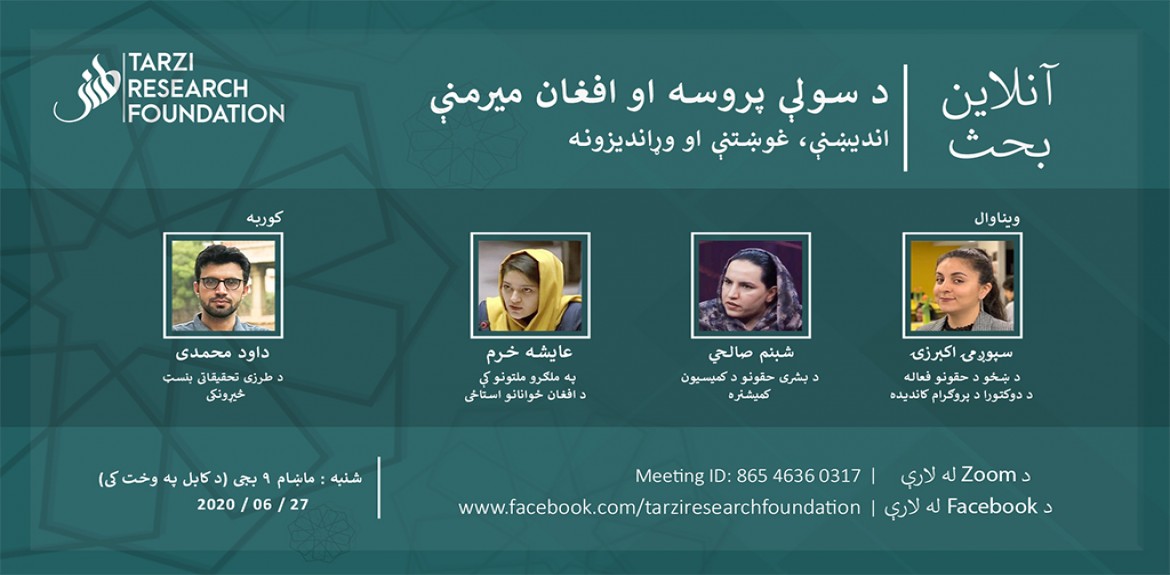
During the discussion, the said panelists highlighted the challenges and opportunities, as well as importance of women inclusion in intra-Afghan talks and the broad peace process, referencing the experiences of peace accords, and theories of renowned thinkers around the globe.
On June 27, 2020, Tarzi Research Foundation (TRF) hosted an online discussion on Afghan Women & Peace Process: Concerns, Demands and Recommendations with Spogmai Akbarzai, Women’s Activist and Ph.D. Candidate; Shabnam Salehi, AIHRC Commissioner, and Aisha Khurram, Afghan Youth Representative to UN. The discussion was hosted and moderated by Dawood Mohammadi, Research Fellow at Tarzi Research Foundation. The event aired live via Zoom, and TRF's Facebook page, and also there was a question and answer session at the end. During the discussion, the said panelists highlighted the challenges and opportunities, as well as the importance of women's inclusion in intra-Afghan talks and the broad peace process, referencing the experiences of peace accords, and theories of renowned thinkers around the globe.
At the outset, Mrs. Spogmai Akbarzai talked about the Afghan peace process and its background, Colombia and Somalia Peace Model and Women Inclusion, and what does the Afghan peace process means to Afghan women. Two models are used in distinct contexts in peace processes. The first model is called Real Model Politics that is used in the international relations arena, i.e. the Cold War between the USA and USSR. The second model is called Conflict Resolution that is used in the internal political context, i.e. uneven conflict between a government and insurgents. Mrs. Akbarzai also talked about the perspective of Feminist security studies, where she specifically emphasized on victims and sacrifices of women and called for justice to be maintained for women. The main reason behind the success of Colombian and Somalian peace negotiations were women's inclusion and political participation, she believed. She asked for women to have a Maximalist Position in the entire peace process.
Then, Commissioner Shabnam Salehi talked about the importance of women’s role in the process and emphasized on official inclusion of women in the peace process. She presented the example of Africa in the late 1990s where women formed an anti-war coalition and were struggling to prevent their men from attending the frontlines. Commissioner Salehi recalled the experiences of women in political processes from the very Bonn conference where they were fewer in number and smaller in the role. Mrs. Salehi also stressed that the Taliban are not changed, particularly when it comes to their behavior towards women; however, the Taliban, in reality, are the same as they were before.
Similar to sentiments expressed by Commissioner Salehi and Mrs. Akbarzai, Aisha Khurram also stressed the concerns of women and called the ongoing conflict as an intelligence war. She mentioned the lack of women’s consensus and a united stand on peace and called for a unified national framework instead of exotic and foreign policies. Aisha also talked about the constitutional rights of women to be preserved and enshrined in the peace accord that will be signed between the Afghan government and the Taliban. “Peace should be both lack of war as well as independence for women” she continued. She called on women to have a cautious and active inclusion in the peace process and grab the support of entire Afghans in this arena. Khurram also proposed that the peace accord between the Afghan government and the Taliban shall be singed in the Loya Jirga Tent of Kabul, instead of Doha, Qatar.
In the final audience Q&A segment moderated by Dawood Mohammadi, Mrs. Akbarzai stressed that the Afghan government and Afghan women shall make an effort that the actual representation of women is ensured. Mrs. Akbarzai affirmed that entire women should raise their voice that the Taliban, who has always oppressed women, is not out of choice, and even should organize demonstrations.
Commissioner Salehi advocated ‘women constructive engagement with media, civil society, NGOs, international counterparts and other types of campaigns through social platforms.’ She suggested that women should not rely solely on government and shall use other mainstreams to make sure their voice is heard.
Additionally, Aisha Khurram emphasized that it is not only women’s right to be included in the peace process but, as citizens, it is their responsibility to take initiatives and even establish local Jirgas “councils” even in Taliban-controlled areas. Aisha, repeatedly accentuated that the detail of the peace accord between the Taliban and the Afghan government should be shared with the Afghan nation before getting signed by the parties.
Moreover, Mrs. Akbarzai harshly criticized the interpretation of Islam by the Taliban, which is inaccurate and extremist, and considered it as “acceptable by no means”.
The event underscored the dire need for women networks (both for rural and urban women through local jirgas) to become established and, then, engaged in the peace process. However, the diversity in political thought and social interventions between rural women and urban women shall become respected. The event also emphasized on comprehensive ceasefire and freedom for women that one is asked by rural women and the other is asked by urban women, as a priority. A survey on women’s demands was counted as an option as well. In the end, it was proposed that an official, direct channel for women (rural and urban) shall be established with negotiating teams.
Panel Discussion video: https://www.youtube.com/watch?v=LqMfYOWar1Q&t=18s
